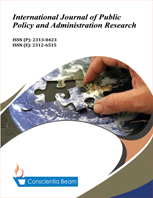Compliance Behaviour in State-Run Fisheries: Situating Lake Chivero in a Policy Perspective
DOI:
https://doi.org/10.18488/journal.74/2015.2.2/74.2.40.59Abstract
Parks and wildlife facilities are intended to contribute people’s wellbeing socially and economically. This aim puts parks and wildlife management in policy. Appropriate management of parks and wildlife for wider social wellbeing is essential. This paper brings out the issues in compliance behaviour of fishers in Zimbabwe’s state-run lakes. The underlying aim of the study is to create policy options that sustain both the fish resources and the wellbeing of the fishers. Zimbabwe’s Parks and Wild Life Management Authority (ZPWMA) administers all state-run lakes in Zimbabwe in order to prevent their over-exploitation. Despite its strict management regulations, the following rather disturbing developments continue to be observed: a) An increase in disregard for the regulations among licensed fishers and an influx of unregistered fishers (poachers). b) A growing incapacity on the part of ZPWMA to contain the worsening non-compliance with management regulations among fishers. c) An increase in the number of illegal fishers entering the fishery. d) An increase in the amount of fish being sold illegally on open markets in Harare and neighbouring towns. The growing non-compliance with regulations could be a result of many factors. Firstly, the worsening economic problems, the rising unemployment as well as the ever-spiralling prices of beef mean that some people are finding fish to be the next cheaper substitute. Secondly, the rather narrow and state centrist approach to fisheries management little considers the practical concerns of fishers giving them no incentive to comply with the regulations. Thirdly, because of the above, the regulations are low in legitimacy, making them less self-enforcing and costly to enforce. At a policy level, the study attempts to find ways of making the existing fisheries management structures, policies and practices at the fishery command more respect and acceptance among fisheries, whilst creating a conducive environment for the fishers to enhance their wellbeing through fishing. The following main recommendations were made: a) Greater attention be paid to the legitimacy aspects of the regulatory institutions as well as the regulations; b) The interests of and concerns of the fishers be more fully incorporated into the management regulations to enhance their acceptance by fishers; and c) The job conditions of ZPWMA employees should be improved to curb corruption and to improve how they interact with fishers.

